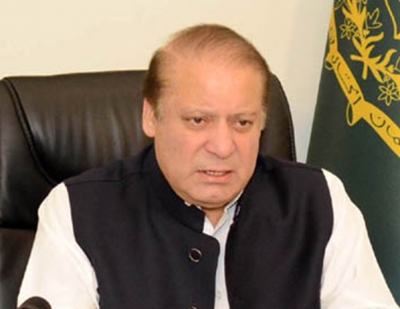World
Pakistan accountability court resumes hearing against Sharifs

Islamabad, Nov 22 (IANS) Ousted Prime Minister Nawaz Sharif, his daughter Maryam Nawaz and son-in-law Captain Muhammad Safdar (Retd.) appeared before an accountability court here on Wednesday as the trial resumed into the corruption references filed against them by the National Accountability Bureau (NAB).
Several senior Pakistan Muslim League-Nawaz leaders accompanied Sharif to the court. The NAB has filed three graft references against the Sharif family relating to the Azizia Steel Mills and Hill Metals Establishment, their London properties and over dozen offshore companies owned by the family.
Sharif and his two sons — Hussain and Hassan — are nominated in all three references whereas Maryam and her husband are only accused in one.
Despite being exempted from appearance, the former Premier and his daughter attended the court hearing. Maryam submitted a request asking the court to alter her exemption period, seeking to be absent from December 5 to January 5, 2018, Dawn online reported.
Similarly, Nawaz sought exemption from appearance from December 5-12. The court is yet to rule on the requests. The Sharif family members left the court after two prosecution witnesses recorded their statements.
Speaking to the media after attending the proceedings, Sharif came down hard on the Pakistan Tehreek-e-Insaf (PTI), and the Opposition Pakistan Peoples Party.
He said “dictator’s black laws were rejected on the floor of the house yesterday”, referring to the rejection in the National Assembly of the Elections Amendment Bill 2017, which sought to restrict disqualified parliamentarians from heading a political party.
The PML-N President lamented the PPP moving of the amendment bill, saying: “The PPP’s support for this bill hurt me. The party’s action has made me question their democratic credentials.”
Talking about the PTI, Sharif said there is nothing democratic about the party, adding that it is not even a political party (due to its link with dictators).
Referring to the courts’ alleged lenient attitude towards PTI Chairman Imran Khan, Sharif said the “rules of the game should be the same”.
Sharif said that verdicts against his family are announced swiftly and wondered when judgments against the PTI leaders will be announced. “The standard of justice applies differently to us than others. The mockery of requisites of justice should be stopped.”
He said corruption cases are now emerging against the PTI leadership as well, including Imran Khan, Jahangir Tareen and Aleem Khan.
–IANS
soni/bg
World
Lockdowns in China Force Urban Communities to Defy Censorship and Vent Frustration Online

Shanghai’s rich middle class is leading a wave of online dissent over the strict and prolonged lockdowns imposed in various parts of the country. Chinese internet censorship is struggling as patience is wearing thin in many urban centers, coming up with creative forms of online protests.
Social Media Posts Revealing Lockdown Tension in Shanghai
Drawn-out lockdowns are nothing new in China as authorities insist with the nation’s zero-Covid policy since the start of the pandemic. Currently over This time around, however, metropolitan areas like Shanghai are increasingly difficult to keep quiet, given that its more than 25 million residents have seen weeks of total isolation along with food shortages and many other service interruptions.
Dozens of towns and reportedly over 300 million Chinese citizens have been affected by lockdowns of different severity. As expected, urban netizens have been most outspoken over their difficulties by finding creative ways to get around state censorship and bans placed on topics, news comments and spontaneous campaigns.
Shanghai residents have been using mobile proxies and hijacking seemingly unrelated hashtags to talk about healthcare issues, delivery failures and the overall severity of their situation. The “positive energy” that the Chinese government wants to transmit during the recent prolonged series of lockdowns does not come naturally to those counting food supplies and online censors are working hard to filter words, trending topics and undesired social media sharing.
WeChat groups and message threads are under constant monitoring. Posts questioning the zero-Covid approach have been quickly deleted, including by leading Chinese health experts like Dr. Zhong Nanshan. Video footage is soon censored and protests and investigations are quickly made to disappear.
Where this has not worked, officials have exposed banners with warnings and outright threats like “watch your own mouth or face punishment”, while drones have been patrolling the city skies. Yet, if anything, this has led to further tensions and unspoken confrontation with Shanghai’s educated and affluent middle class.
Creative Online Solutions Harnessing Civic Energy
Announcements by Chinese social media that they would be publishing the IP addresses of users who “spread rumors” have not helped either. Tech industry research has shown that much of Asia’s tech-savvy population has a habit of using mobile proxies and other privacy tools, quickly finding workarounds to browse the internet freely and talk to the world about the hottest topics.
The sheer volume of forbidden posts is already a challenge for the very censorship system, experts explain. Unable to track all trending hashtags, state workers overlook topics that speak about the US, Ukraine or other popular news. Linking human rights elsewhere to their situation, Chinese online dissidents establish their informal channels and “hijack” the conversation to share personal or publicly relevant information about the Covid suppression in their town.
Sarcastic and satirical posts still dominate. Others hope to evade the censors by replacing words from famous poems or the national anthem. One thing is certain – social media, when harnessed with the right creativity, has proven its ability to mount pressure on the government in even some of the most strictly controlled tech environments like China.











